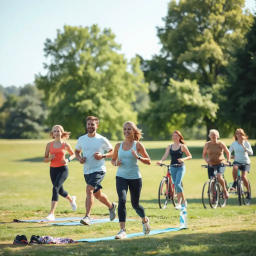
- Wellness
- Jun 11
2025-05-20
Have you ever felt overwhelmed by anxiety, wishing for a simple tool to regain control? Mindfulness exercises offer a powerful solution, allowing us to manage anxious feelings while fostering a deeper connection with ourselves. This article explores the transformative effects of mindfulness on anxiety and provides practical insights for incorporating these techniques into daily life.
Practicing mindfulness exercises can lead to several positive outcomes for anxiety management. The following visual summarizes the key benefits:
Mindfulness helps us recognize emotional patterns.
Regular practice can significantly lower anxiety levels.
Mindfulness enhances our ability to manage emotions effectively.
Practicing mindfulness can sharpen concentration and clarity.
Mindfulness equips us with tools to cope with stress more effectively.
Have you ever felt that tight knot in your stomach when anxiety starts to creep in? It's a sensation that many of us know all too well. Yet, the good news is that practicing mindfulness exercises can be a powerful ally in managing those anxious feelings. At Mind and Meridian, I’m passionate about exploring how these techniques not only provide relief but also promote a greater sense of well-being.
So, what exactly are mindfulness exercises? They involve focusing on the present moment without judgment. This practice encourages us to tune into our thoughts, feelings, and sensations in a gentle way, helping us cultivate awareness and acceptance. By incorporating these exercises into our daily lives, we can create a sanctuary of calm amidst life's ups and downs.
Mindfulness exercises are designed to help us become more aware of our thoughts and feelings in a non-reactive way. They serve a purpose far beyond just relaxation; they aim to foster a deeper connection with ourselves. Imagine being able to pause and take a breath when anxiety strikes, instead of letting it take control! That’s the magic of mindfulness. For those new to mindfulness, exploring mindfulness techniques for newcomers can be a great starting point.
Some common mindfulness exercises include:
Each of these practices helps anchor us in the present moment, paving the way for a more balanced emotional state. At Mind and Meridian, we believe that these exercises can set the foundation for a transformative wellness journey.
Now, let’s delve into how mindfulness can actually help reduce anxiety. When we engage in mindfulness exercises, we give ourselves the opportunity to step back from overwhelming thoughts. This practice helps us understand that our thoughts and feelings are not necessarily facts—they’re just passing experiences. How empowering is that?
Research shows that practicing mindfulness can lead to significant reductions in anxiety levels. Here are some key benefits:
These insights are vital, especially for those of us navigating the challenges of daily life. By incorporating mindfulness into our routines, we can create a buffer against anxiety and stress, ultimately fostering a more peaceful existence.
To further support your journey, consider exploring holistic ways to boost mental health, which can complement your mindfulness practice.
With our understanding of mindfulness growing, it’s fascinating to explore how these exercises affect our brains. The neuroscience behind mindfulness shows how it can reshape neural pathways, promoting healthier responses to stress. Isn't it incredible that just a few minutes of practice can lead to such significant changes?
To maximize the benefits of mindfulness exercises, try integrating them into your daily routine by setting specific times for practice—perhaps first thing in the morning or right before bed. This consistency can help solidify your practice and create a calming ritual that eases your mind and prepares you for the day ahead.
As we wrap up our exploration of mindfulness exercises and their positive effects on anxiety, it's important to highlight some key benefits. Practicing mindfulness can help reduce feelings of stress, promote a sense of calm, and enhance emotional resilience. According to Harvard Health Publishing, mindfulness meditation may ease anxiety and mental stress
Mindfulness exercises enable us to develop a deeper awareness of our thoughts and feelings. This awareness allows us to respond to anxiety triggers with more control. Instead of feeling overwhelmed, we can pause, breathe, and choose our next steps wisely. Truly, the power of mindfulness can transform our daily experiences!
When we delve into the world of mindfulness, several crucial points emerge. Here are some essential takeaways that can guide your journey:
These benefits show us that mindfulness isn't just a trend; it's a powerful tool for our mental health! Taking small steps toward incorporating mindfulness into our routines can yield significant results.
Interested in beginning your own mindfulness journey? Delve into starting meditation at home with these simple steps.
I wholeheartedly encourage you to embrace mindfulness as part of your daily routine. Even dedicating a few minutes each day to mindfulness can lead to profound changes in your life. Perhaps start with simple exercises like mindful breathing or guided meditation. As you experience the calming effects, you might find yourself looking forward to these moments of tranquility.
Consistency is key! Just like nurturing a plant, the more attention and care we give to our mindfulness practice, the more we will reap its benefits. So, join me on this journey! Together, at Mind and Meridian, we can explore various mindfulness exercises and share our experiences, supporting each other along the way.
As you continue your exploration of mindfulness and its benefits for anxiety management, you may have questions or seek further guidance. That's perfectly normal! Engaging with the community can help enhance your understanding and practice.
Here are some frequently asked questions (FAQs) to provide more clarity:
To help you further on your mindfulness path, here are some excellent resources you might find beneficial:
Participating in online courses can provide structured learning experiences. These courses often include guided exercises and expert insights. One of the best ways to understand how to find the right fit for your needs is by exploring acupuncture clinic options for a comprehensive approach to wellness.
Joining local or online mindfulness groups can create a sense of community. Sharing your progress with others enhances motivation and fosters connections.
Remember, at Mind and Meridian, we are here to support you on your journey toward holistic wellness! Embracing mindfulness can be a transformative experience, and I can't wait to see how it impacts your life. Happy practicing!
Here is a quick recap of the important points discussed in the article:
